 January 2023 in “Han'gug mi'saengmul saengmyeong gong haghoeji/Han-guk misaengmul saengmyeong gonghak hoeji”
January 2023 in “Han'gug mi'saengmul saengmyeong gong haghoeji/Han-guk misaengmul saengmyeong gonghak hoeji” NOC-4 extract promotes black hair and hair growth effectively.
 April 2017 in “The journal of investigative dermatology/Journal of investigative dermatology”
April 2017 in “The journal of investigative dermatology/Journal of investigative dermatology” QMSI is a valuable method for studying drug penetration in skin tissues.
April 2019 in “Journal of Drug Delivery and Therapeutics” Poly herbal shampoo powders are effective for hair care and meet modern needs.
 2 citations,
May 2023 in “Nanomaterials”
2 citations,
May 2023 in “Nanomaterials” Microemulsions could improve skin drug delivery but face challenges like complex creation and potential toxicity.
20 citations,
January 2019 in “Toxicology Reports” Dunaliella salina microalgae is safe to eat and may boost health.
 7 citations,
January 2022 in “Anais Da Academia Brasileira De Ciencias”
7 citations,
January 2022 in “Anais Da Academia Brasileira De Ciencias” Essential oils from Hedychium spicatum have potential for developing natural drugs with pain-blocking, fever-reducing, anti-inflammatory, and antioxidant properties.
6 citations,
January 2013 in “Journal of Ayurveda and integrative medicine” The detoxification process made Abrus precatorius seeds safe and effective for use.
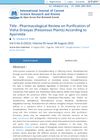 August 2022 in “International Journal of Current Science Research and Review”
August 2022 in “International Journal of Current Science Research and Review” Ayurveda can make poisonous plants medicinal through specific purification processes.
 205 citations,
September 2018 in “Nutrients”
205 citations,
September 2018 in “Nutrients” Essential oils from Curcuma species, like turmeric, have compounds that can fight inflammation, cancer, and bacteria, and can also stimulate hair regrowth in bald males.
21 citations,
April 2021 in “ACS omega” Curcumin can be effectively loaded into polystyrene nanoparticles, which are safe for human cells and more biocompatible with curcumin inside.
 18 citations,
December 2021 in “Foods”
18 citations,
December 2021 in “Foods” Seaweeds contain beneficial compounds with potential uses in food, cosmetics, and health, but more research is needed to improve extraction and safety.
 August 2024 in “Drug Design Development and Therapy”
August 2024 in “Drug Design Development and Therapy” Decursin shows promise for treating cancer, neuroprotection, inflammation, and hair loss.
 August 2023 in “International Journal of Molecular Sciences”
August 2023 in “International Journal of Molecular Sciences” The new hydrogel with zinc and polysaccharides improves wound healing and has antibacterial properties.
 July 2023 in “International Journal of Cosmetic Science”
July 2023 in “International Journal of Cosmetic Science” Biopolymers are increasingly used in cosmetics for their non-toxicity and skin benefits, with future biotech advancements likely to expand their applications.
 January 2022 in “Food Science and Technology”
January 2022 in “Food Science and Technology” The herbal mixture could potentially improve hair loss.
January 2023 in “Applied sciences” Equisetum debile extracts may help with skin whitening, anti-wrinkle, and anti-hair loss treatments.
January 2023 in “International Journal of Trichology” The hemp extract significantly increased hair regrowth in both men and women without any side effects.
 February 2024 in “Journal of Cellular and Molecular Medicine”
February 2024 in “Journal of Cellular and Molecular Medicine” A hydrogel releasing pectolinarin speeds up wound healing and reduces scarring.
 January 2024 in “Deleted Journal”
January 2024 in “Deleted Journal” Essential oils may help hair health but lack strong scientific proof and can cause allergic reactions.
 98 citations,
May 2008 in “Archives of Dermatological Research”
98 citations,
May 2008 in “Archives of Dermatological Research” Eclipta alba extract helps hair grow faster and more effectively than minoxidil in rats.
 78 citations,
December 2011 in “Clinical toxicology”
78 citations,
December 2011 in “Clinical toxicology” Excessive selenium from a supplement caused toxicity but patients recovered with care.
 25 citations,
January 2011 in “Pharmacognosy magazine”
25 citations,
January 2011 in “Pharmacognosy magazine” Nardostachys jatamansi DC compounds help promote hair growth.
 2 citations,
March 2015 in “Toxicology and Environmental Health Sciences”
2 citations,
March 2015 in “Toxicology and Environmental Health Sciences” Rice bran extract caused moderate skin irritation but no eye irritation, while a diluted essence was not irritating to skin and only slightly to guinea pigs.
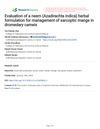 1 citations,
January 2023 in “Research Square (Research Square)”
1 citations,
January 2023 in “Research Square (Research Square)” A neem-based herbal treatment worked better than ivermectin for sarcoptic mange in camels, improving their recovery and overall health.
 September 2022 in “Research Square (Research Square)”
September 2022 in “Research Square (Research Square)” Caffeic acid helps protect rats from the harmful effects of acrylamide.
 June 2022 in “International Journal for Research in Applied Science and Engineering Technology”
June 2022 in “International Journal for Research in Applied Science and Engineering Technology” The herbal shampoo made from Piper Betel and Psidium Guajava leaves was safe, promoted hair growth, and reduced hair fall.
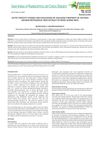 September 2019 in “Asian Journal of Pharmaceutical and Clinical Research”
September 2019 in “Asian Journal of Pharmaceutical and Clinical Research” Teak seed extract is safe and reduces pain in mice.
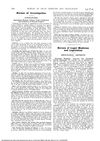 August 1946 in “Journal of the American Medical Association”
August 1946 in “Journal of the American Medical Association” Companies agreed to stop false advertising about their products' health benefits.
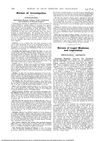 August 1946 in “Journal of the American Medical Association”
August 1946 in “Journal of the American Medical Association” Companies agreed to stop making false health claims about their products.
 316 citations,
June 2004 in “The journal of investigative dermatology/Journal of investigative dermatology”
316 citations,
June 2004 in “The journal of investigative dermatology/Journal of investigative dermatology” Microspheres about 1.5 micrometers in size can best penetrate hair follicles, potentially reaching important stem cells.
























